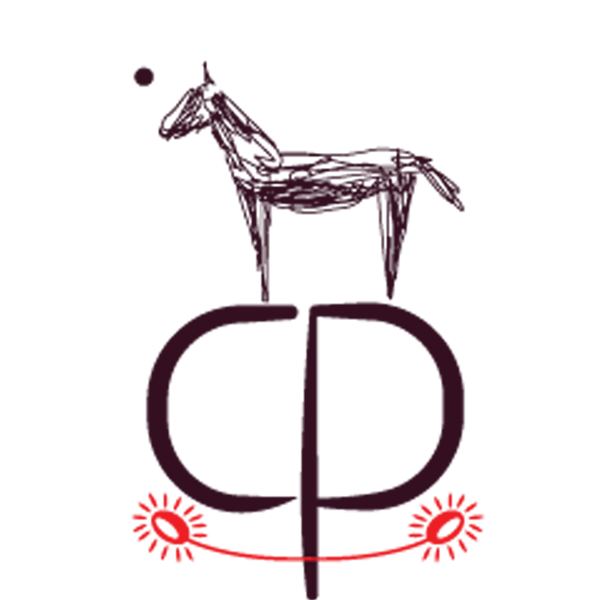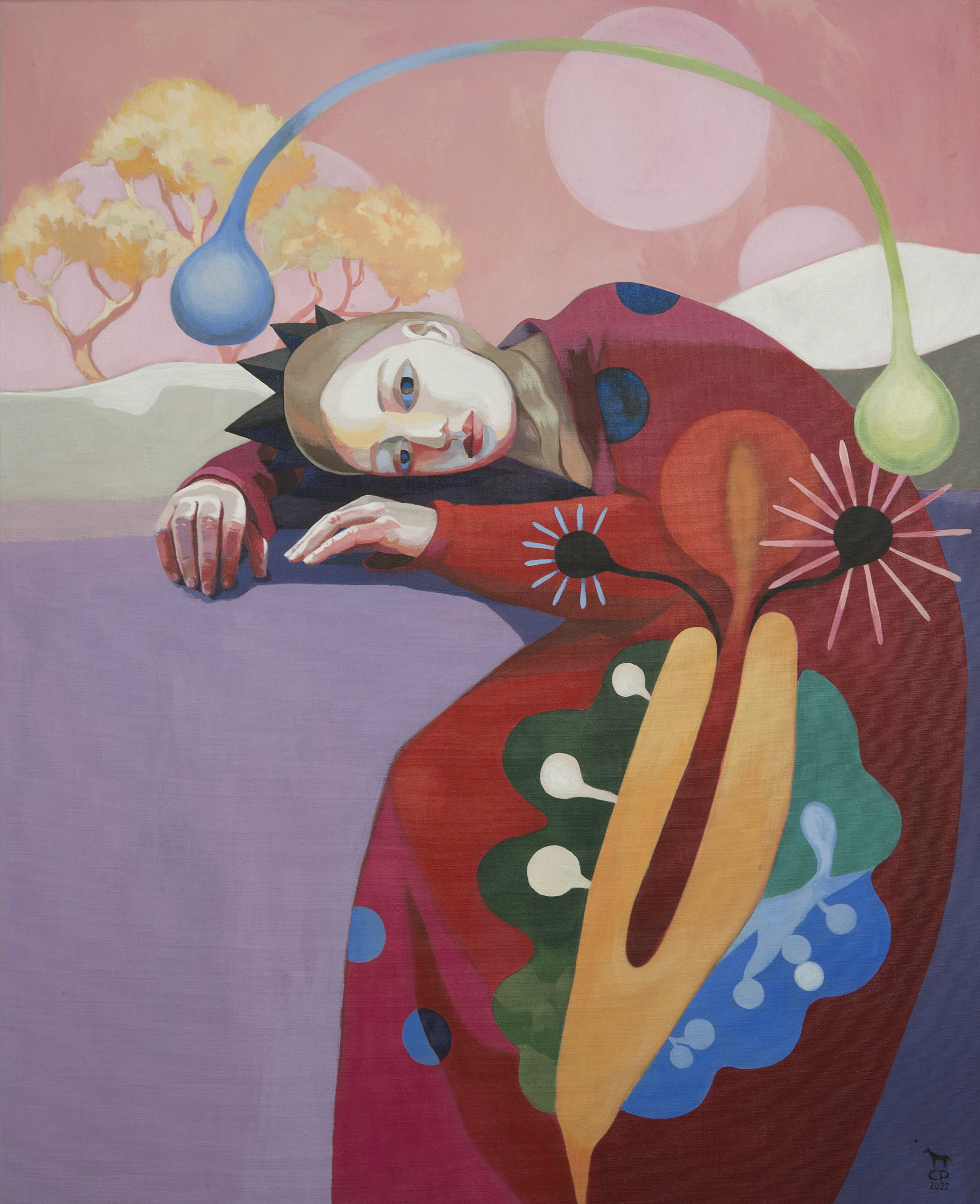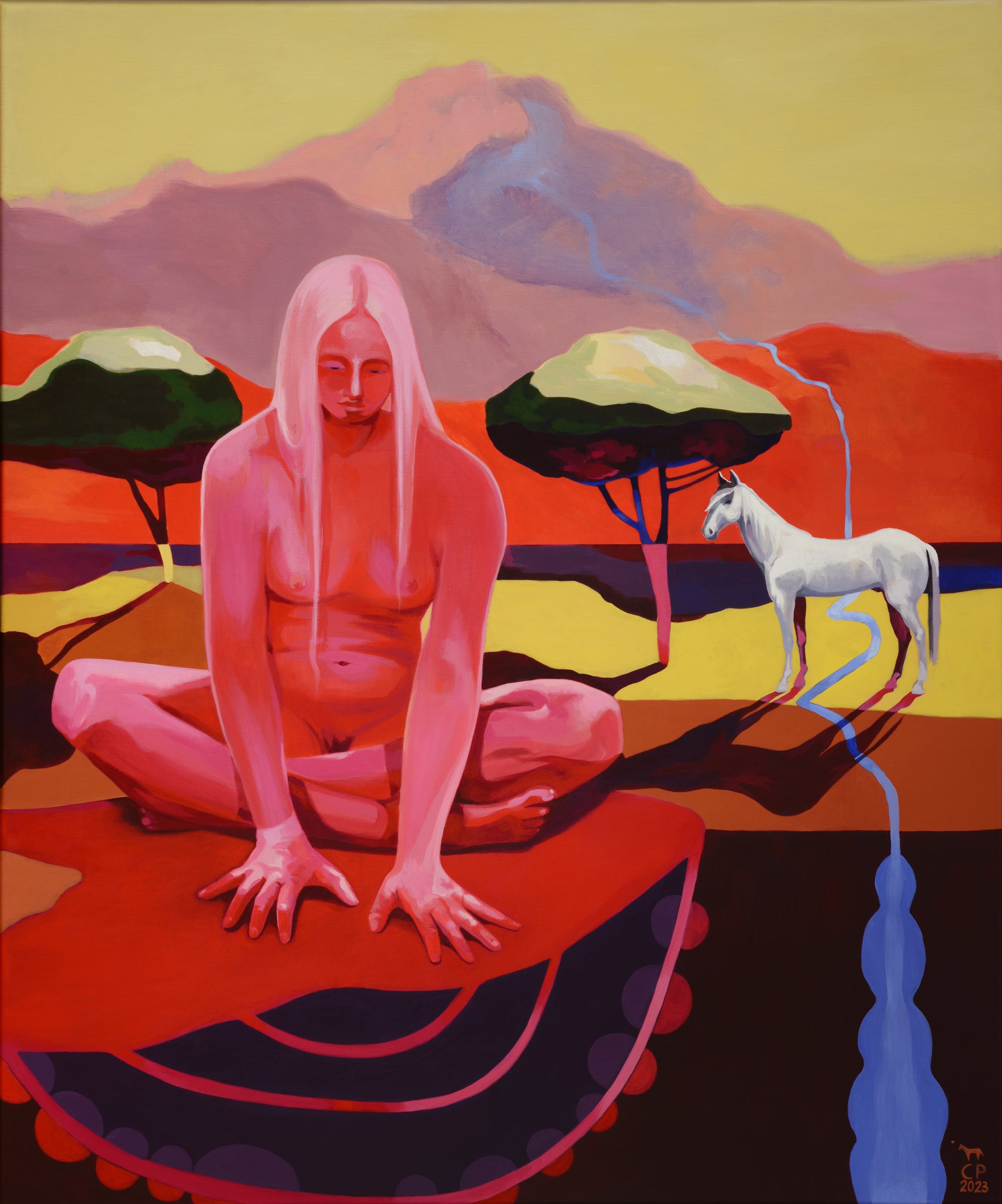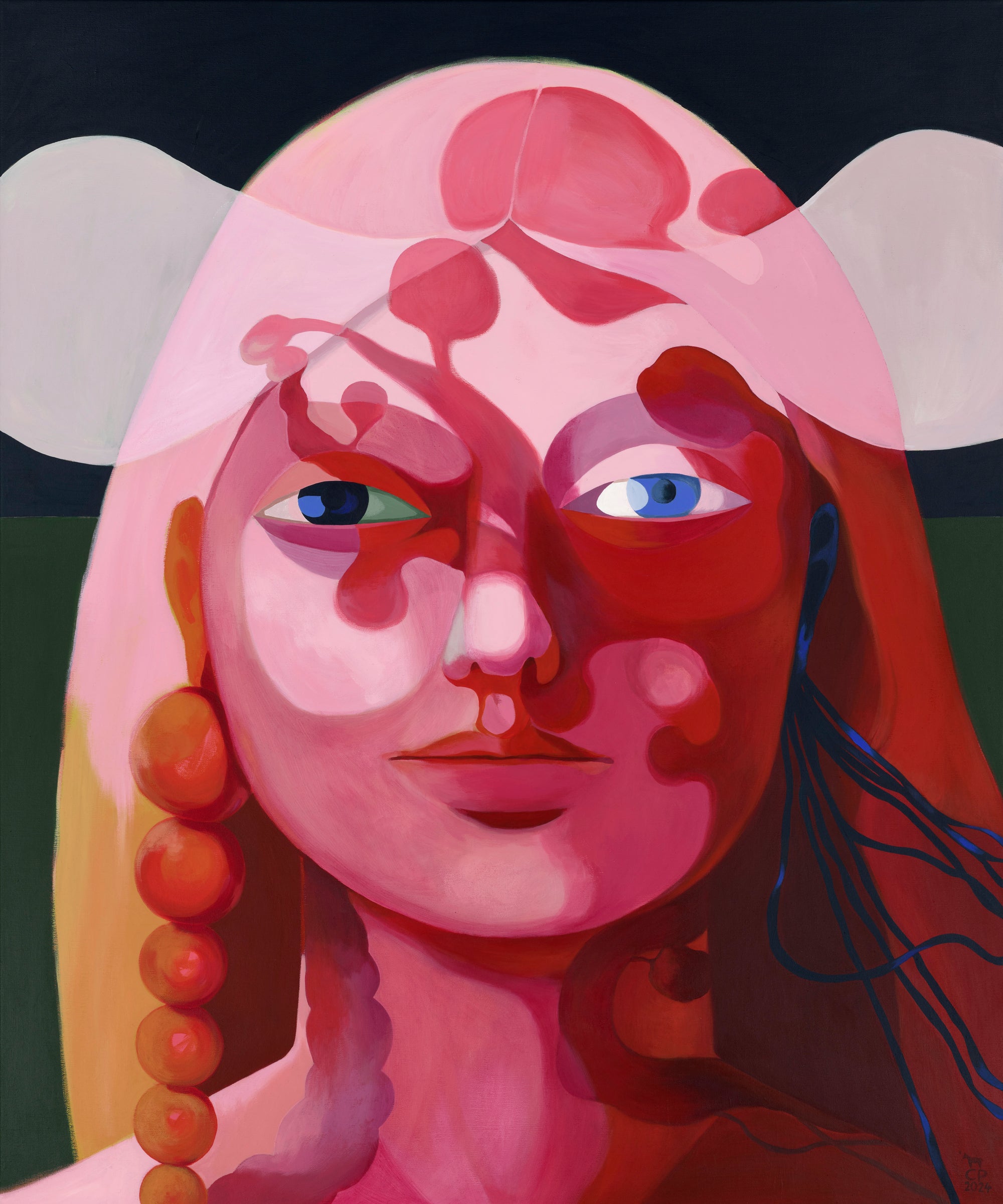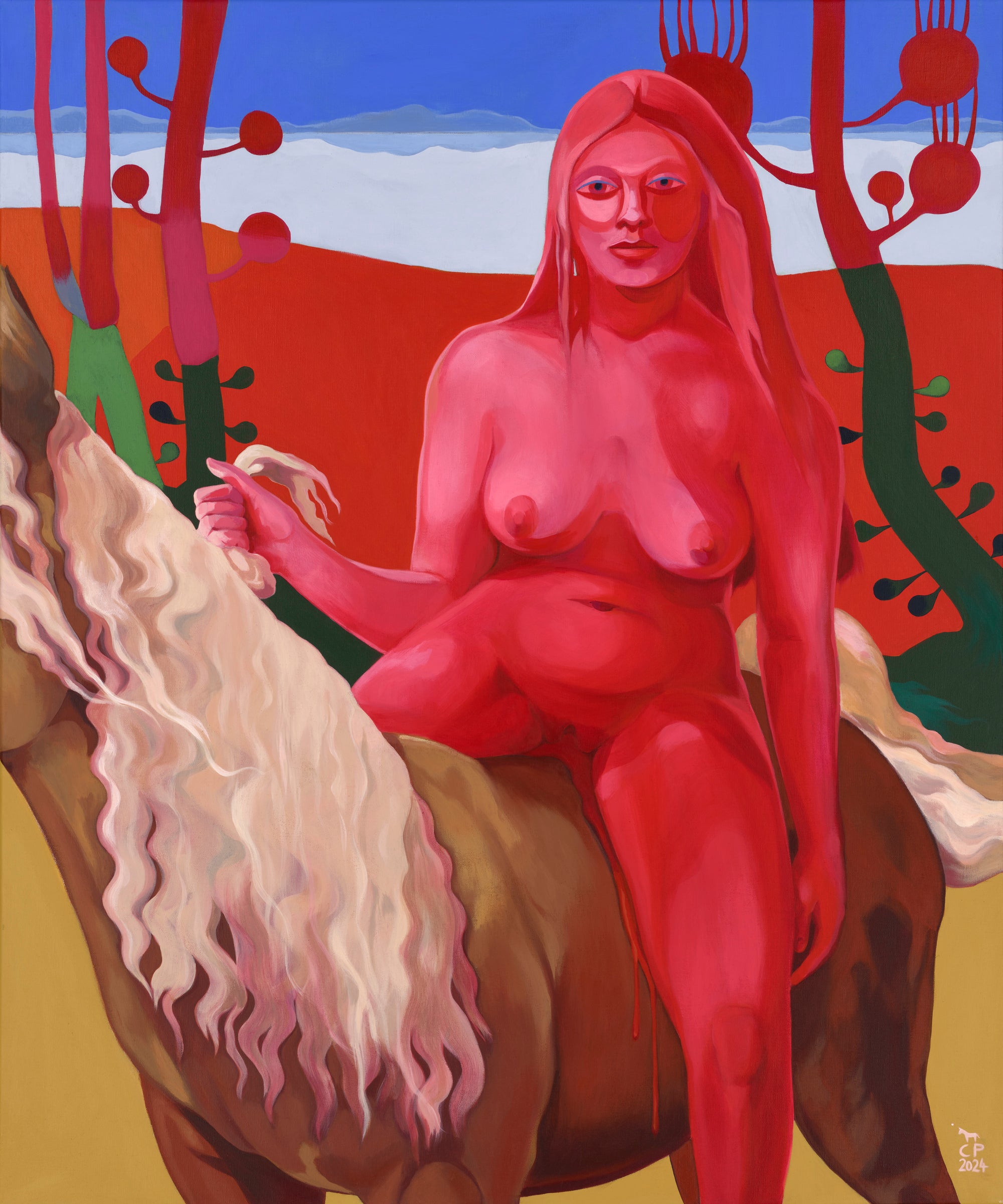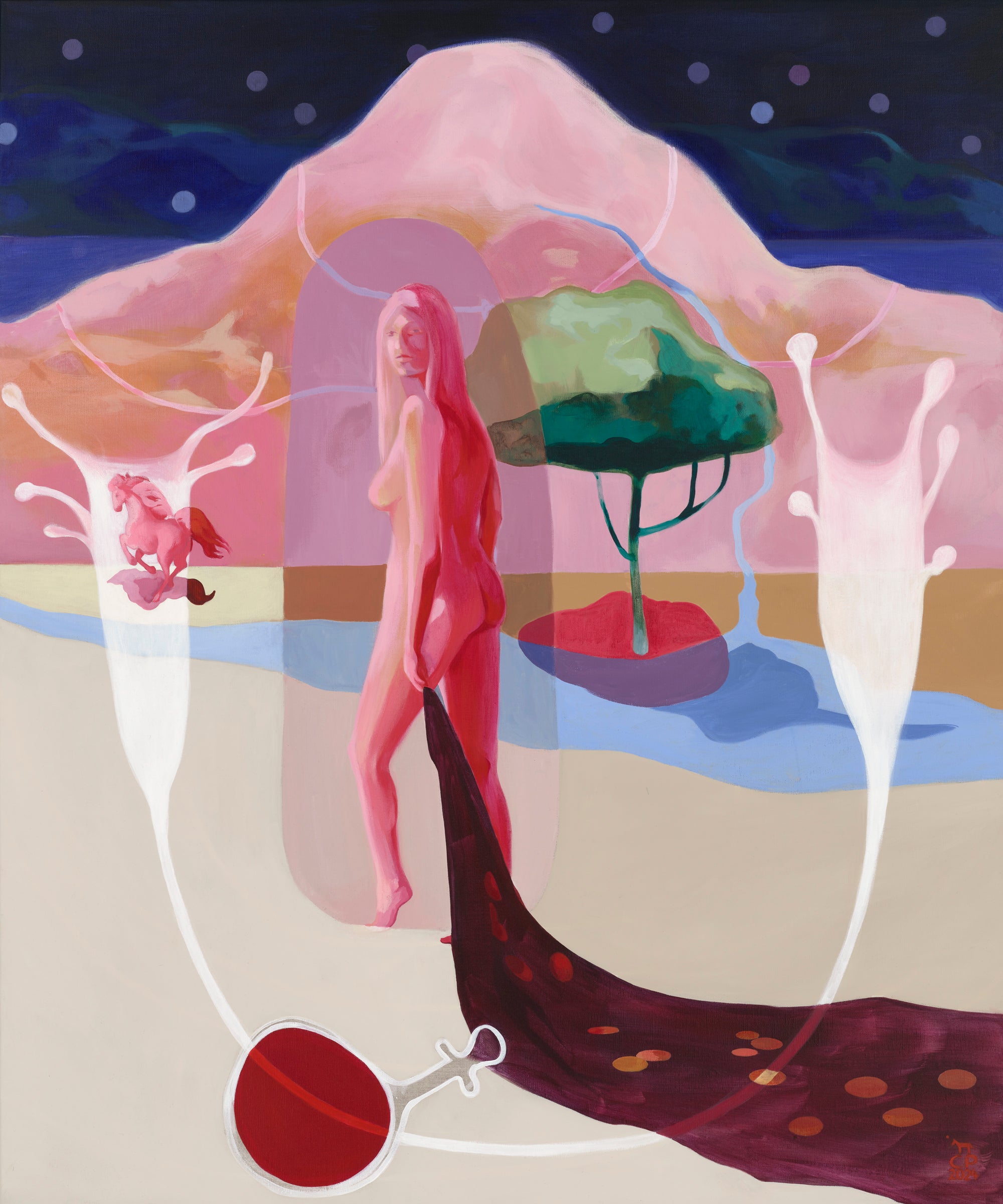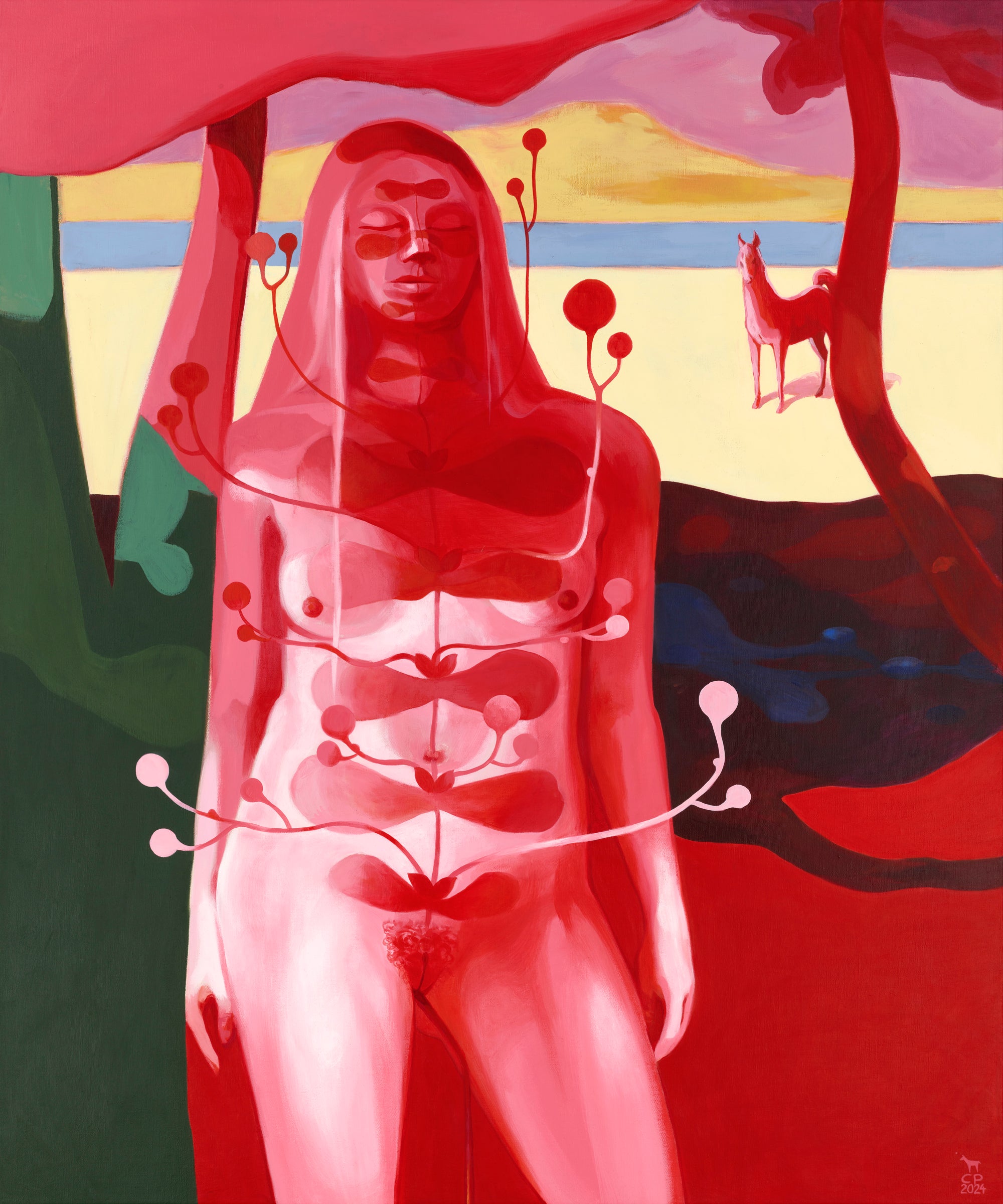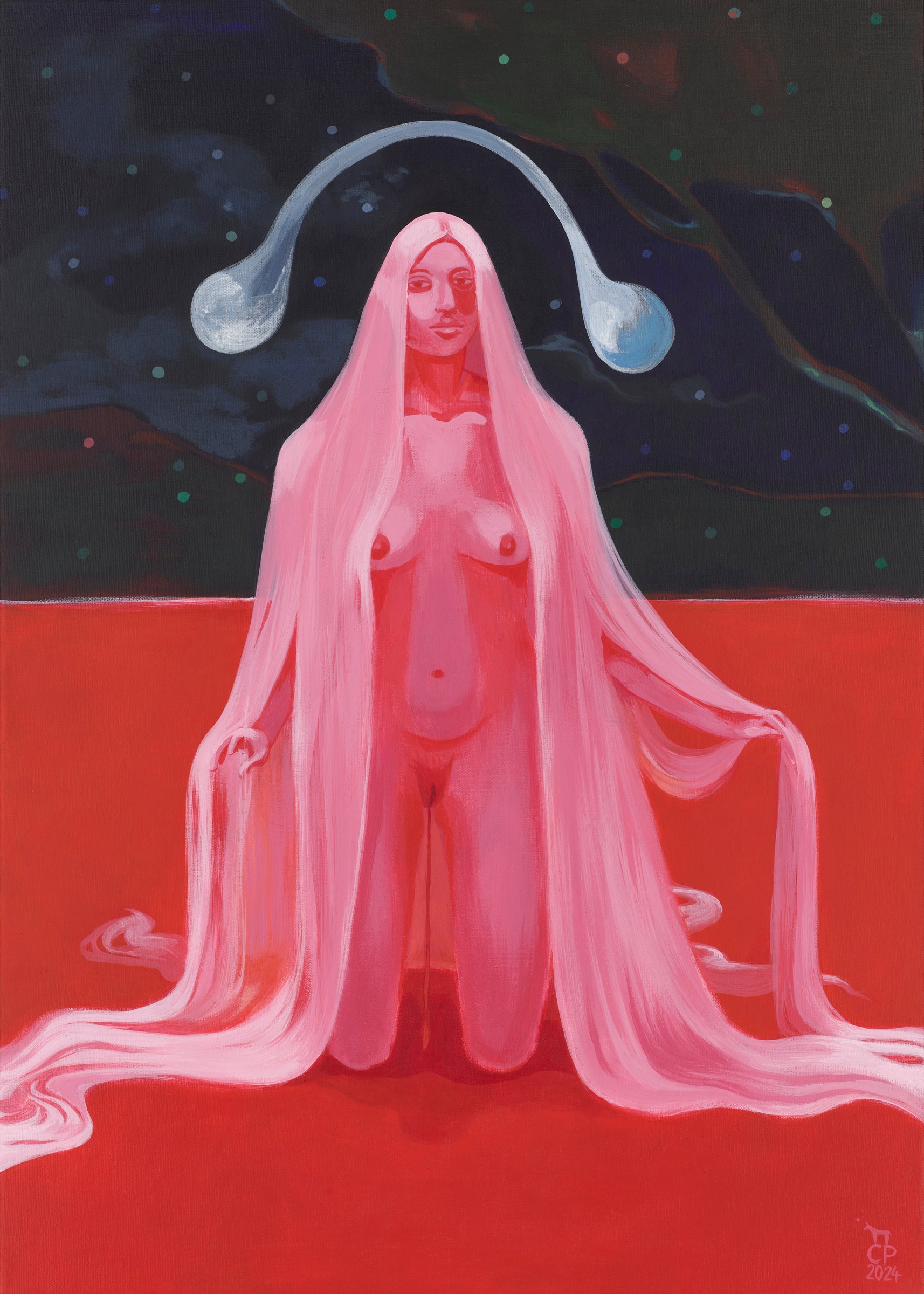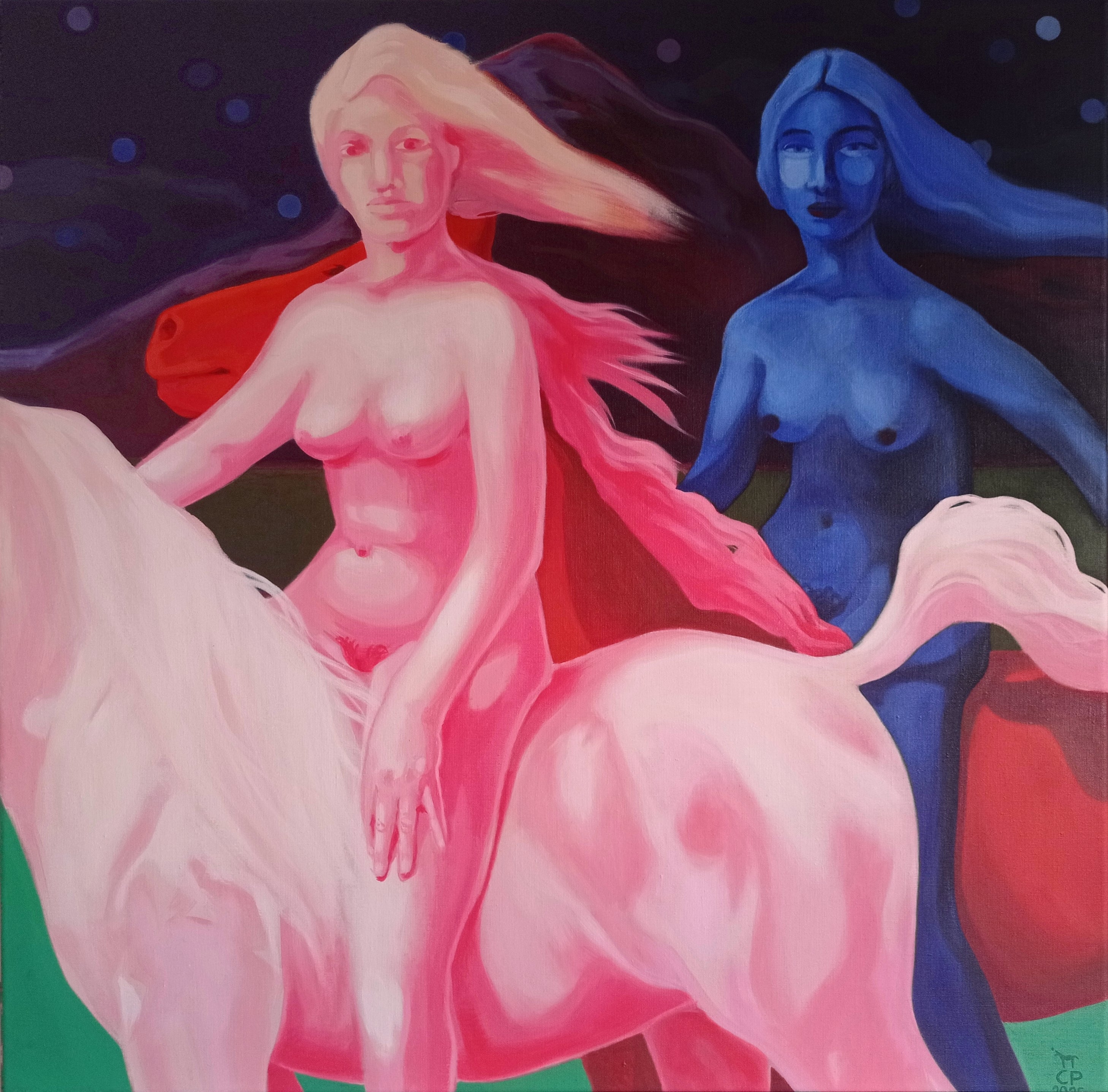In die Utopie hinein leben
“Living into utopia” appeared in my artistic life in 2022 and has since become a kind of North Star for me. It began with the image “The Word Surrender” and the story associated with it.
The image was created in the midst of exhaustion from months of night shifts in front of my laptop, during which I advanced my career by building an online shop. In the back of my mind was the urge to finally make it, to finally be successful, to finally prove to those around me that I was on the right path, to finally stop despairing inwardly at the excessive demands of life—to finally flourish.
'The word Surrender', Claudia Pollack, 2022, acrylic on linen, 80 x 100 cm
I realized then that I couldn't achieve this through even more effort, because my strength was limited and my day only had a certain number of hours. Surrender—giving in, giving up the fight—was the theme. During this time, questions arose in me about how I wanted to live as a person, but above all as a woman, and how I could live at all. How could I achieve something in this world and within these structures and realize my potential without losing all serenity, slowness, and enjoyment of life and myself? It was a struggle between action and trust. Trust that I obviously didn't have. And I recognized my personal circumstances in an even bigger picture: Isn't everyone somehow struggling, pushing their own limits and losing themselves in a social system that seems to know and value only growth as a straight line?
'Something inside me looks at the sea and everything else too', Claudia Pollack, 2023, acrylic on linen, 80 x 100 cm
But that wasn't the only circumstance that brought these questions to my mind. There are 13 years between the births of my children. I gave birth to my daughter when I was 27, and to my son when I was 40. When I was 45, I began to feel an increasingly loud desire within me to go out, do my own thing, give birth to my spiritual children, and become more effective as a woman in the world. I realized that the most important relationship in my life was the one with myself and with this endless flow of creative energy within me. I would have liked to have lived without any relationship for a while. I felt torn between being a mother to a small child and my immense desire for freedom. I hated the constant organization of everyday family life and all the things that weren't possible. I felt trapped. And I know that I am not the only woman who feels this way about motherhood. And quite a few men probably feel the same way. Despite the fact that I have a partner who shares everything fifty-fifty with me in an extremely fair way, I felt this way. Could it be because every family unit within its four walls, with its resources, tries to manage on its own?
'To root', Claudia Pollack, 2023, acrylic on linen, 100 x 120 cm
And more and more questions arose. I wondered whether this was normal, whether it was natural. Why are families, with a few exceptions, constantly stressed? Why do I lose myself, my sensuality, my awareness, my serenity so much in the process? Why is it so often about financial resources and the question of how to manage everything? Where can I find the space to live my life to the fullest and give my best? When will I have the opportunity to feel myself again, to break these chains? How long will this continue?
'Gates', Claudia Pollack, 2023, acrylic on linen, 100 x 120 cm
And that wasn't all. Another issue came to the fore, namely the question of how I wanted to shape my relationship life. For most of my life up to that point, I had been focused on the men I was in relationships with. Suddenly, my mission in the world felt more important than my personal relationship with a man, my partner. Somehow, the balance shifted, and that was frightening for me and my partner. The focus on the nuclear family no longer made any particular sense to me. It seemed more like a socially constructed construct, which it is. I began to question whether the nuclear family is the constellation in which I, as a woman, but also we as human beings, thrive best. In this questioning, I saw what I and probably many others were really missing: community – “the village,” a fluctuating field of mutual give and take beyond the boundaries of one's own family, women (and men) coming together and thus basking in their own energy, freedom from financial pressure and freedom from functioning as if natural rhythms of life such as the female cycle, caring for children, and the right to rest did not exist.
This list is not exhaustive, and I bet you could add to it.
'Eva – open and safe', Claudia Pollack, 2024, acrylic on linen 100 x 120 cm
Just recently, I was sitting by the fire at a birthday party, chatting with some women. We got talking about the pictures in my calendar from last year, which they had seen in the hostess's kitchen. During this conversation, we felt we had identified the starting point for redesigning our societies: recognizing the female cycle.
We have tampons, pads, menstrual cups, period underwear, painkillers, and a “we can do this” attitude. Outwardly, we simply carry on as normal during our periods. We are sold the idea that it is a worthwhile goal not to let our periods deter us from our goals and activities.
But what does our body actually want, like a tree that sheds its leaves in autumn and cannot sprout green shoots? To rest, to die a little, to reinvent itself, and to start all over again in a few days. This is a physical and energetic effort that the female body makes every month. It is not a deficiency, it is a gift. It is a fact. It is a celebration of life and the integration of death. It is transformation. Even without giving birth to physical children, we give birth to ideas and visions every month with the power of our bleeding. Have you ever noticed how close you are to your intuition during your period?
'Inner Doors', Claudia Pollack, 2024, acrylic on linen, 100 x 120 cm
We suppress this process throughout society through hormonal contraception and ignoring it in everyday life. Your boss would probably give you the cold shoulder if you wanted to stay home because you had your period, don't you think? Probably right. With full pay, of course, because having your period is not your personal flaw or your personal sensitivity. It is natural, normal in the best sense of the word, and a reality for half of the people on our planet. What does it cost us all that we do not use the wisdom of the female cycle because we do not allow women to rest? Because we ourselves as women also resist this rest, because we rush ourselves internally? What does it cost us that we all rush ourselves, internally and externally?
Ein Teil Von, Claudia Pollack, 2024, Acryl auf Leinen, 100 x 120 cm
Jetzt stell Dir mal vor, Frauen würden sich während ihrer Blutung den Raum nehmen, den sie dafür brauchen. Stell Dir vor, sie würden ihn sogar bereitet bekommen. Sie könnten zu Hause bleiben, ihrer Intuition lauschen, Arbeitgeber würden staatlich unterstützt und eine Lohnfortzahlung damit problemlos. Es wäre gesellschaftlich getragen, durch Frauen, Männer und Institutionen. Ich spüre eine Welle der Entspannung durch mich gehen, indem ich das schreibe. Wie geht es Dir damit?
Und befindet sich vielleicht genau an dieser Stelle die Tür zu einer insgesamt gesünderen Gesellschaft, weil nicht nur wir Frauen diese Ruhe brauchen sondern auch die weiblichen Anteile in Männern? Könnte das Heilung sein?
Warten Auf Das Ende Aller Kriege, Claudia Pollack, 2024, Acryl auf Leinen, 50 x 70 cm
In einer Gesellschaft, in der die Periode der Frau diesen Stellenwert wieder erhalten würde, was meinst Du, wie würde sie mit der Natur unserer noch größeren Mutter, mit noch größeren Zyklen umgehen? Schützend? Wertschätzend? Bewahrend? Genau. Und wenn das so wäre, wer würde gegen wen in den Krieg ziehen? Genau. Niemand.
Und da ist er, der im wahrsten Sinne des Wortes rote Faden. Indem das Weibliche die Wertschätzung erfährt, die ihm gebührt, fällt alles wieder an seinen Platz. Weil der weibliche Aspekt in allen und allem seinen Raum einnehmen darf. Auch in Männern, auch in der Gestaltung unserer gesellschaftlichen Strukturen, in der Art, wie wir unseren Kindern begegnen, wie Familien mit Fürsorge bedacht werden, wie Menschen und Staaten miteinander umgehen. Die Periode der Frau ist politisch!
Beschütztes Land, Claudia Pollack, 2025, Acryl auf Leinen, 100 x 120 cm
Jetzt lass uns den Kreis rund machen. „In die Utopie hinein leben“ ist, was ich tue, indem ich diese Erkenntnisse in mein ganz persönliches Leben integriere. Ich fange an, indem ich den momentanen Standard nicht mehr einfach akzeptiere. Ich sage: „Nein, ich will es anders.“ Für mich, für Dich, für uns. So beginne ich, in die Utopie hinein zu leben. Es beginnt mit Mikroentscheidungen. Einmal mehr mich trauen, echt zu sprechen, nein oder ja zu sagen. Einmal mehr nicht schweigen. Einmal mehr zu ruhen trotz aller Hetze. Nein, ich sehe nicht die Notwendigkeit, mehr reinzupassen in Erwartungen und eine Gesellschaft, die das Leben in der Tiefe (noch) nicht ehrt. Ich erzähle es weiter, ich lebe es vor. So mache ich es.
Wie kannst Du es machen, Schwester?
